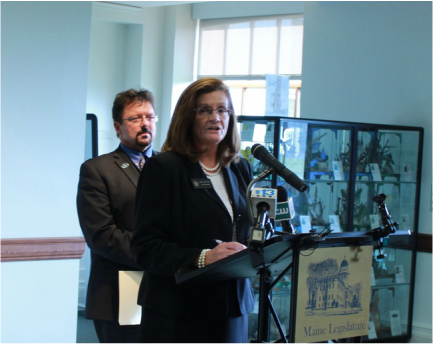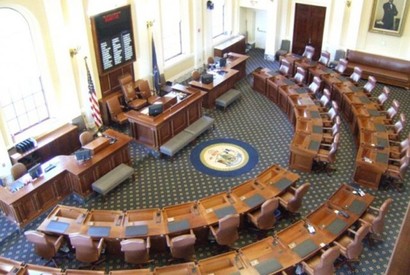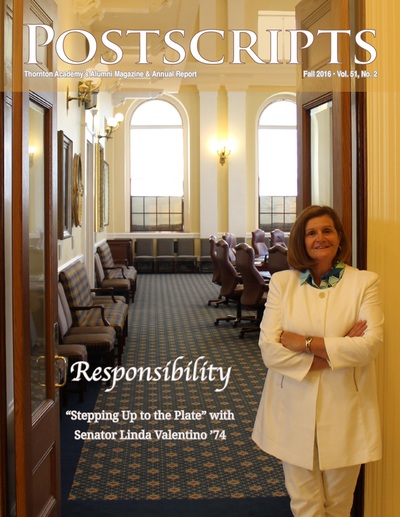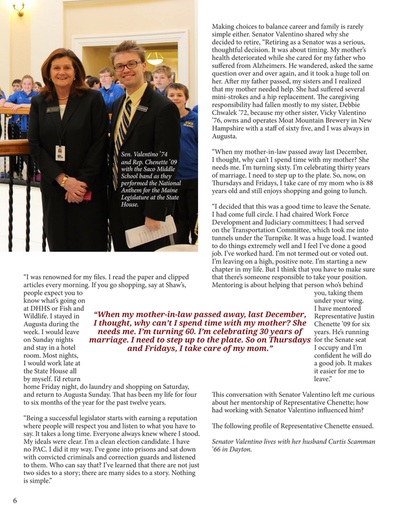|
0 Comments
AUGUSTA — Families of unsolved homicide victims voiced their support for a bill introduced by Sen. Linda Valentino, D-Saco, that would extend the statute of limitations for civil actions to be sought to 6 years.
Currently in Maine, a family of a homicide victim has only a 2 year window from the date of the victim’s death for bringing civil actions. The bill, LD 1605, would give families a window of 6 years from the time the victim’s family becomes aware that there may be a cause of action against a defendant. “In my conversations with families of homicide victims I hear over and over again that the statute of limitations is too short,” said Sen. Valentino. “This bill would bring some fairness to the system for families, no matter how quickly a homicide is solved.” For families of homicide victims whose cases go unsolved for a number of years, the extended statute of limitations gives more time for further evidence to be gathered - they may not know against whom to bring a civil action within the current 2 year timeframe. Lisa Ouellette, who continues to await her daughter’s murder to be solved, wrote in support of the bill, saying that “it’s been 17 years since Ashley passed but I had to file civil suit just within the two years of her passing.” Although the bill would not retroactively change the status of the statute of limitations for the families who testified, they chose to do so in order to help make the situation better for the families who will, unfortunately, find themselves in the same situation in the future. “Losing a family member to homicide is, clearly, a traumatic experience and filing a civil action against the perpetrator within two years of the death is too much to bear,” said Sen. Valentino. “Expanding the timeframe will allow those families to take time to mourn and begin to heal and only file the action when they are emotionally ready to do so.” Also speaking in support of the bill was Attorney General Janet Mills. No one spoke in opposition. The Judiciary Committee members present unanimously approved the bill to move forward to the Senate. AUGUSTA — A bill by Sen. Linda Valentino to construct a modern, consolidated courthouse in York County won the bipartisan endorsement of the Legislature’s Judiciary Committee on Tuesday.
“I’m thankful for the committee’s support and look forward to this bill’s passage in the full Legislature,” said Sen. Valentino. “This vote shows what can happen when local, county and state officials get together to do the right thing for our communities. The people of York County deserve a safe, modern and efficient access to justice. This bill will get them there.” AUGUSTA | Today the Senate members and House Democrats on the Legislature’s Appropriations Committee voted to approve a bipartisan bill to combat drug addiction in Maine through law enforcement, treatment, prevention, and recovery. The bill was voted Ought to Pass as Amended 9-4. Representatives Timberlake (R-Turner), Sirocki (R-Scarborough), Nutting (R-Oakland) and Winsor (R-Norway) declined to support the majority report citing opposition based on relatively minor issues within the bill.
 AUGUSTA — Sen. Linda Valentino, D-Saco, and Rep. Karl Ward, R-Dedham, hosted the families of unsolved homicide victims at the State House on Tuesday, and announced further legislation aimed at helping those families find closure and justice. During a lunch meeting, the families expressed their hopes and desires for further action regarding how the state handles unsolved homicides. The families highlighted the need for transparency and communication with law enforcement, and additional resources to tell their stories and seek civil damages associated with the unsolved homicides. “We met with families today to listen and to learn. What we heard was clear: We made progress last year with the ‘cold case squad’ bill, and we’re in a better position now than we were last year,” Sen. Valentino said. “The Attorney General’s Office has worked hard to create and staff this new unit, but the families of victims still have unmet needs.” AUGUSTA --Today, in a near final step to becoming law, the Senate referred the Cold Case Homicide Squad bill to the so-called “special appropriations table,” where it will be considered by the Appropriations Committee for funding.
The bill, LD 1121, "An Act To Fund the Cold Case Homicide Unit in the Department of the Attorney General," has already received initial approval in both the House and Senate. Senator Valentino was compelled to bring this bill forward after hearing from several family members of the victims of unsolved murders in Maine, including one in her own community. In 1999, the 15 year old daughter of a friend was murdered. Sixteen years later, her killer has never been brought to justice. “For more than a decade I have felt helpless and dismayed that there are 120 unsolved murders in Maine; but today, as a Senator, I no longer feel helpless,” said Democratic State Senator Linda Valentino of Saco, a sponsor of the measure. "Law enforcement is now one step closer to being able to take a fresh look at these cases.” The measure has garnered an outpouring of support from both sides of the aisle and from the public. At the press conference and public hearing, lawmakers heard heartbreaking stories from families, including that of Trista Reynolds, mother of 18 month old Ayla Reynolds who went missing in 2011 and is presumed murdered by police; Ramona Torres, mother of Angel Torres, 21, who police believe was a victim of foul play after he disappeared on Mother’s Day of 1999; Lise Ouellette, mother of Ashley Ouellette, 15, whose body was discovered on the side of the road in Scarborough 15 years ago. “As a Senator on the Appropriations Committee, I have also introduced an amendment to secure funding in the current budget,” added Senator Valentino. “We owe it to the victims, the families, and the public to make this a priority.” The bill has been placed on the Special Appropriations Table to await funding.  AUGUSTA - Fifteen Senate Republicans flipped from their initial support of a bill that prohibits financial institutions and creditors from mailing unsolicited loan offers known as “live” checks to small businesses and upheld Gov. LePage’s veto. “When the governor vetoed the bill, he said it was because this practice was ‘likely prohibited’. That is not good enough for me. I don’t buy it. Either it is or it isn’t prohibited,” said Democratic State Senator Linda Valentino of Saco, the sponsor of the bill. “This is a measure that would have helped our small businesses like our sole proprietors. It is disappointing that others aren’t sticking with their votes to stand with me in protecting Maine’s businesses.” The measure received support from the Superintendent of the Maine Bureau of Consumer Credit Protection Will Lund and Assistant Attorney General Linda Conti. The state’s Insurance and Financial Services committee voted unanimously in support of the bill, including the committee’s chair, Senator Whittemore who then voted against overriding the governor’s veto. The bill would have enacted a new provision in the Uniform Deceptive Trade Practices Act prohibiting the use of a solicitation designed to resemble a “negotiable instrument,” including a check, unless the document clearly states on its face that it is not negotiable. Uncharted loan companies would have been prohibited from mailing the solicitations, which have the appearance of an actual check but when cashed by the recipient constitute acceptance of a loan. Two-thirds or 24 votes is needed to override a veto; however the bill was four votes short of overriding the veto. LD 455, “An Act To Prohibit Deceptive Practices Regarding Negotiable Investments,” is now dead. “Live” checks: Bad deal that preys on elderly
AUGUSTA - A measure that prohibits financial institutions and creditors from mailing unsolicited loan offers known as “live” checks passed in the Maine Senate today. “Now when someone receives one of these ‘live’ checks they can call the Attorney General and they will have an avenue to protect themselves,” said Democratic Senator Linda Valentino of Saco, the sponsor of the measure. “We cannot allow companies to prey on the elderly or other folks who may be down on hard times.” The bill enacts a new provision in the Uniform Deceptive Trade Practices Act prohibiting the use of a solicitation designed to resemble a “negotiable instrument,” including a check, unless the document clearly states on its face that it is not negotiable. Uncharted loan companies would be prohibited from mailing the solicitations, which have the appearance of an actual check but when cashed by the recipient constitute acceptance of a loan. “After receiving multiple ‘live’ checks in the mail, I was inspired to submit this legislation,” added Sen. Valentino. “While I was lucky enough to determine the false nature of these checks, it can be incredibly difficult to know what to do. It’s no wonder why so many others are misled into applying for loans and getting locked into a never-ending cycle of debt.” The measure protects both consumers and business to business solicitation. The measure received support from the Superintendent of the Maine Bureau of Consumer Credit Protection Will Lund and Assistant Attorney General Linda Conti. The bill, LD 455, “An Act To Prohibit Deceptive Practices Regarding Negotiable Investments,” now goes to the governor for his signature to become law. For the past few months, I, along with my colleagues on the state’s budget writing committee, have been examining Gov. LePage’s $6.5 billion budget. As you may remember from my previous column, the Appropriations Committee has held numerous public hearings where we heard from hundreds of people--from economists to municipal officials and non-profit leaders. Additionally, I have held a number of community forums in Saco, Old Orchard Beach, Biddeford, and Hollis to hear what you were thinking about the governor’s recommended changes to the tax code. I commend Gov. Lepage for joining the much-needed conversation on tax reform--and I agree with him that our archaic tax code is one of the things holding Maine back. But, after closer analysis of the LePage plan--and after hearing from the public, it has become clear that his priorities are out of step with the needs of Maine people.
Last week, Democrats released the “Better Deal for Maine” budget, a counterproposal to Gov. LePage’s plan. In it, we invest in middle-class economics: our plan allows more Mainers to keep more of their hard-earned money. It lowers property taxes for all Maine homeowners. And, rather than shifting the tax burden on to our communities, as proposed by Gov.LePage, our plan asks non-residents, the top income-earners, and corporations to pay their fair share. Here’s how the Better Deal for Maine stacks up to the LePage plan: The Better Deal does not raise the sales tax rate. While the Better Deal adopts the sales tax broadening plan as proposed by the governor, the Better Deal keeps the sales tax rate at 5.5%--unlike the LePage plan that raises the sales tax to 6.5%. The Better Deal cuts property taxes for all Maine homeowners. The LePage plan eliminates the Homestead Exemption for everyone--except those over the age of 65. The Better Deal doubles the Homestead Exemption to $20,000 for all Maine homeowners--regardless of age. This means, for folks living in Saco or in Biddeford where the mill rates are comparable, a homeowner will see a property tax cut of about $380 compared to $0 as proposed under the LePage plan. For folks who live elsewhere, with an average mill rate of 15, they will see a property tax cut of $300--again, compared to $0 under the LePage plan. Additionally, the Better Deal increases the Property Tax Fairness Credit--up to $1,500 per qualifying homeowner. Together, these property tax measures will save Maine residents $120 million per year. The Better Deal cuts income taxes. While the LePage plan favors top income earners by giving 50% of his tax cut to only the top 10% wage earners (individuals with taxable income more than $134,000), the Better Deal directs 98% of income tax breaks to the bottom 95%.
The Better Deal does not tax non-profits. The governor creates a new tax on non-profits. The Better Deal invests in Maine's future. It invests an additional $20 million more dollars per year in K-12 local schools, getting the state two percentage points closer to the voter-mandated 55% goal. Finally, the Better Deal is fiscally responsible. It’s fully paid for now and into the future. The LePage plan is not paid for and actually creates a budget hole of $300 million. In order for Maine to be a place of prosperity and opportunity, then that work starts with the Better Deal for Maine. This is a plan that should garner the support of Democrats, Republicans and unenrolleds alike because it’s a plan that reflects our values and our priorities. It charts out our course for success--for today and in to the future. It gives young Mainers a reason to stay here and others a reason to make Maine their home. I encourage you to read more about our plan at http://betterdeal.me/ LePage budget would dismantle work of community-based services
AUGUSTA – The governor’s plan to make deep cuts in mental health services puts at-risk vulnerable Mainers by reducing the availability of vital services, increasing wait lists and pushing them toward crisis, according to testimony at public hearings before the Appropriations and Financial Affairs Committee and the Health and Human Services Committee. The governor’s proposed state budget would impose 10 percent across-the-board cuts in Medicaid behavioral and mental health services. The governor’s budget would also deal cuts of about 60 percent to some providers in the area of medication management, services now provided by psychiatrists and psychiatric nurses to ensure that patients are complying with their regimens and not in danger of potentially dangerous drug complications. In his testimony, Tom McAdam, chief executive of Kennebec Behavioral Health, referred to a 1996 tragedy in Waterville in which a severely mentally ill man bludgeoned to death two elderly nuns and left two others severely injured. He described how the case galvanized mental health services in Maine. “I think it had a fairly major impact on the entire system. I think that it helped to bring resources into the community-based side. And frankly, many of us that are in the provider community are confused by some of the initiatives in this budget because they kind of run counter to what we thought our role and responsibility (were) as community providers,” McAdam said. “Really, next to housing, for people to be successful med management – access to med management – is important. And we already have an access issue, and that really is especially true for the kids.” Democrats reaffirmed their commitment to a budget that protects the most vulnerable Mainers. “The governor’s cuts would shred our safety net. They would have devastating effects on some of our most vulnerable Mainers – those grappling with severe mental illness – as well as their families and communities. Slashing mental health services to this extent has grave implications for public health and public safety in Maine. It’s beyond irresponsible to play games with people’s lives and public safety like this. The governor has presented us with a series of false choices. We do not need to pit one group against another,” said Rep. Peggy Rotundo, D-Lewiston, House chair of the budget-writing committee. “The facts presented today over hours of testimony show that we must protect mental health services. These drastic cuts would prevent Mainers with mental illness from getting needed care and push them toward crisis. Providing sufficient services is not only compassionate, it makes economic sense. Severely mentally ill people who cannot access the services they need often wind up in emergency rooms or in jail, much more expensive and traumatic experiences that can be avoided,” said Sen. Linda Valentino, D-Saco, a member of the budget-writing committee. |
Latest News
State and Local News Archives
October 2016
Categories |






 RSS Feed
RSS Feed


